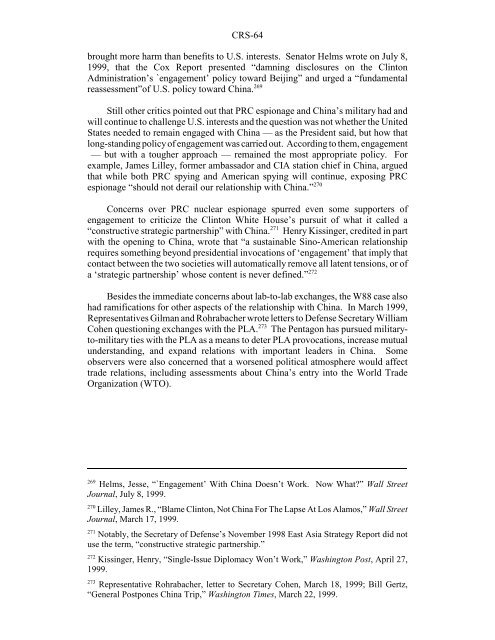China: Suspected Acquisition of U.S. Nuclear Weapon Secrets
China: Suspected Acquisition of U.S. Nuclear Weapon Secrets
China: Suspected Acquisition of U.S. Nuclear Weapon Secrets
Create successful ePaper yourself
Turn your PDF publications into a flip-book with our unique Google optimized e-Paper software.
CRS-64<br />
brought more harm than benefits to U.S. interests. Senator Helms wrote on July 8,<br />
1999, that the Cox Report presented “damning disclosures on the Clinton<br />
Administration’s `engagement’ policy toward Beijing” and urged a “fundamental<br />
reassessment”<strong>of</strong> U.S. policy toward <strong>China</strong>. 269<br />
Still other critics pointed out that PRC espionage and <strong>China</strong>’s military had and<br />
will continue to challenge U.S. interests and the question was not whether the United<br />
States needed to remain engaged with <strong>China</strong> — as the President said, but how that<br />
long-standing policy <strong>of</strong> engagement was carried out. According to them, engagement<br />
— but with a tougher approach — remained the most appropriate policy. For<br />
example, James Lilley, former ambassador and CIA station chief in <strong>China</strong>, argued<br />
that while both PRC spying and American spying will continue, exposing PRC<br />
espionage “should not derail our relationship with <strong>China</strong>.” 270<br />
Concerns over PRC nuclear espionage spurred even some supporters <strong>of</strong><br />
engagement to criticize the Clinton White House’s pursuit <strong>of</strong> what it called a<br />
“constructive strategic partnership” with <strong>China</strong>. 271 Henry Kissinger, credited in part<br />
with the opening to <strong>China</strong>, wrote that “a sustainable Sino-American relationship<br />
requires something beyond presidential invocations <strong>of</strong> ‘engagement’ that imply that<br />
contact between the two societies will automatically remove all latent tensions, or <strong>of</strong><br />
a ‘strategic partnership’ whose content is never defined.” 272<br />
Besides the immediate concerns about lab-to-lab exchanges, the W88 case also<br />
had ramifications for other aspects <strong>of</strong> the relationship with <strong>China</strong>. In March 1999,<br />
Representatives Gilman and Rohrabacher wrote letters to Defense Secretary William<br />
Cohen questioning exchanges with the PLA. 273 The Pentagon has pursued militaryto-military<br />
ties with the PLA as a means to deter PLA provocations, increase mutual<br />
understanding, and expand relations with important leaders in <strong>China</strong>. Some<br />
observers were also concerned that a worsened political atmosphere would affect<br />
trade relations, including assessments about <strong>China</strong>’s entry into the World Trade<br />
Organization (WTO).<br />
269 Helms, Jesse, “`Engagement’ With <strong>China</strong> Doesn’t Work. Now What?” Wall Street<br />
Journal, July 8, 1999.<br />
270 Lilley, James R., “Blame Clinton, Not <strong>China</strong> For The Lapse At Los Alamos,” Wall Street<br />
Journal, March 17, 1999.<br />
271 Notably, the Secretary <strong>of</strong> Defense’s November 1998 East Asia Strategy Report did not<br />
use the term, “constructive strategic partnership.”<br />
272 Kissinger, Henry, “Single-Issue Diplomacy Won’t Work,” Washington Post, April 27,<br />
1999.<br />
273 Representative Rohrabacher, letter to Secretary Cohen, March 18, 1999; Bill Gertz,<br />
“General Postpones <strong>China</strong> Trip,” Washington Times, March 22, 1999.
















